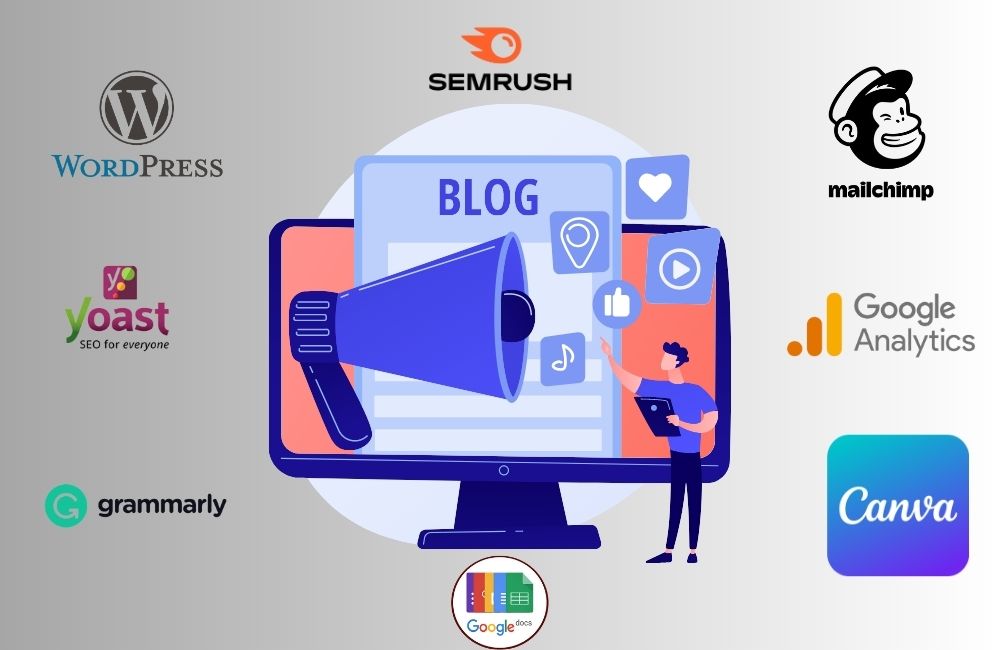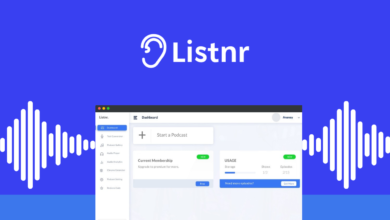Are you ready to take your blogging game to the next level? Whether you’re just starting out or you’ve been in the game for a while, having the right tools can make all the difference in your blogging journey. In this post, we’ll explore ten essential tools that every serious blogger should have in their arsenal. These tools will help you create better content, grow your audience, and make your blogging life a whole lot easier.
1. A Reliable Content Management System (CMS)
At the heart of every successful blog is a solid content management system. This is where you’ll create, edit, and publish your posts, so it’s crucial to choose one that suits your needs.
WordPress: The Blogger’s Favorite
WordPress is by far the most popular CMS among bloggers, and for good reason. It’s user-friendly, highly customizable, and has a vast library of plugins and themes. Here’s why WordPress stands out:
- Easy to use, even for beginners
- Huge community of users and developers
- Regular updates and improvements
- Countless themes and plugins to extend functionality
- SEO-friendly out of the box
If you’re just starting out, WordPress.com offers a free, hosted solution. For more control and flexibility, you can opt for a self-hosted WordPress.org site.
Other CMS Options
While WordPress is great, it’s not the only option. Some other popular CMS choices include:
- Wix: Great for beginners who want a drag-and-drop interface
- Squarespace: Known for its sleek, modern designs
- Ghost: A minimalist platform focused on publishing
Choose the CMS that feels right for you and your blogging goals.
2. A Powerful Keyword Research Tool
If you want your blog posts to reach your target audience, you need to know what they’re searching for. That’s where keyword research tools come in handy.
Google Keyword Planner
Google’s free Keyword Planner is a great starting point for keyword research. It provides valuable insights into search volumes and competition for different keywords. However, it’s primarily designed for advertisers, so the data might not be as detailed as you’d like for content creation.
SEMrush: A Comprehensive SEO Suite
For more in-depth keyword research and SEO analysis, SEMrush is a popular choice among bloggers. It offers:
- Detailed keyword data, including search volume and difficulty
- Competitor analysis
- Content gap analysis
- Backlink tracking
While SEMrush isn’t free, many bloggers find its comprehensive features worth the investment.
3. A Robust Writing and Editing Tool
Great content starts with great writing. Having a reliable writing and editing tool can help you produce polished, error-free posts.
Grammarly: Your Personal Proofreader
Grammarly is like having a personal editor at your fingertips. It checks your writing for:
- Spelling and grammar errors
- Punctuation mistakes
- Style and tone issues
- Plagiarism (in the premium version)
The free version of Grammarly is quite powerful, but the premium version offers more advanced features that can really elevate your writing.
Hemingway Editor: For Clear and Concise Writing
If you want to make your writing more clear and impactful, the Hemingway Editor is a great tool. It highlights:
- Complex sentences
- Passive voice
- Adverbs
- Hard-to-read phrases
By following Hemingway’s suggestions, you can make your writing more direct and easier to read.
4. A Versatile Image Editing Tool
They say a picture is worth a thousand words, and in the world of blogging, that couldn’t be more true. Eye-catching images can make your posts more engaging and shareable.
Canva: Design Made Easy
Canva is a user-friendly graphic design tool that’s perfect for bloggers who aren’t professional designers. With Canva, you can:
- Create custom blog headers
- Design social media graphics
- Make infographics
- Edit photos
Canva offers a generous free plan, with a premium version available for more advanced features.
Adobe Photoshop: For More Advanced Editing
If you’re serious about image editing and have some design skills, Adobe Photoshop is the industry standard. It offers powerful tools for:
- Photo retouching
- Complex image manipulation
- Creating custom graphics
While Photoshop has a steeper learning curve and comes with a monthly subscription, its unbeatable for advanced image editing.
5. A Reliable Web Hosting Service
If you’re using a self-hosted blog, choosing the right web hosting service is crucial. A good host will ensure your blog loads quickly and stays online.
Hostinger: WordPress-Recommended Hosting
Bluehost is officially recommended by WordPress and offers:
- One-click WordPress installation
- 24/7 support
- Free SSL certificate
- Affordable plans for beginners
Namecheap: High-Performance Hosting
For bloggers who need top-notch performance, SiteGround is a popular choice. They offer:
- Excellent uptime and speed
- Advanced security features
- Great customer support
- Easy WordPress management
Remember, your hosting needs may change as your blog grows, so choose a provider that offers scalable solutions.
6. An Email Marketing Platform
Building an email list is one of the most effective ways to grow your blog audience. An email marketing platform helps you manage your list and send newsletters.
MailChimp: User-Friendly Email Marketing
MailChimp is a popular choice for bloggers, offering:
- A free plan for up to 2,000 subscribers
- Easy-to-use email templates
- Automation features
- Integration with many blogging platforms
ConvertKit: Made for Creators
ConvertKit is designed specifically for bloggers and content creators. It provides:
- Powerful segmentation and tagging
- Easy-to-use forms and landing pages
- Automation sequences
- A clean, intuitive interface
While it’s more expensive than some alternatives, many bloggers find ConvertKit’s creator-focused features worth the investment.
7. A Social Media Management Tool
Social media is a key part of promoting your blog and engaging with your audience. A good management tool can help you stay on top of your social media presence.
Buffer: Schedule and Analyze Your Posts
Buffer allows you to:
- Schedule posts across multiple platforms
- Analyze your social media performance
- Collaborate with team members
- Curate content to share
Hootsuite: Comprehensive Social Media Management
For more advanced social media management, Hootsuite offers:
- Scheduling for multiple networks
- Social media monitoring
- Team collaboration features
- Detailed analytics
Both Buffer and Hootsuite offer free plans with limited features, as well as paid plans for more functionality.
8. An Analytics Tool
To grow your blog, you need to understand how it’s performing. That’s where analytics tools come in.
Google Analytics: The Gold Standard
Google Analytics is free and provides a wealth of information about your blog’s performance, including:
- Traffic sources
- Popular content
- User behavior
- Conversion tracking
While it can be overwhelming at first, learning to use Google Analytics is invaluable for any serious blogger.
Clicky: Real-Time Web Analytics
If you find Google Analytics too complex, Clicky offers a simpler alternative with:
- Real-time analytics
- Heatmaps
- Individual visitor tracking
- Easy-to-understand reports
Clicky has a free plan for small sites, with paid plans offering more features.
9. A Productivity and Organization Tool
Staying organized and productive is crucial when you’re juggling content creation, promotion, and all the other tasks that come with blogging.
Trello: Visual Project Management
Trello uses a card-based system to help you:
- Plan your content calendar
- Track your to-do list
- Collaborate with team members
- Visualize your workflow
Evernote: Your Digital Notebook
Evernote is great for:
- Saving article ideas
- Taking notes during research
- Organizing your thoughts
- Collaborating on content
Both Trello and Evernote offer free plans that are sufficient for most bloggers, with premium plans available for additional features.
10. A Backup Solution
Last but certainly not least, you need a way to back up your blog. Losing all your hard work due to a technical glitch would be devastating.
UpdraftPlus: Easy WordPress Backups
If you’re using WordPress, UpdraftPlus is a popular plugin that:
- Automatically backs up your site
- Stores backups in the cloud (Google Drive, Dropbox, etc.)
- Makes restoring your site easy
BackupBuddy: Comprehensive WordPress Backup
For more advanced backup features, BackupBuddy offers:
- Complete WordPress backups
- Easy site migration
- Malware scanning
- Scheduled backups
Remember, no matter which tool you choose, regular backups are crucial for protecting your blog.
Conclusion: Equip Yourself for Blogging Success
There you have it – ten essential tools that every serious blogger needs. From content management to social media, from writing to analytics, these tools cover all aspects of running a successful blog.
Remember, while having the right tools is important, they’re just that – tools. The most crucial elements of a successful blog are still your unique voice, valuable content, and genuine engagement with your audience.
So, equip yourself with these tools, but don’t forget to focus on what really matters – creating great content that resonates with your readers. Happy blogging!





